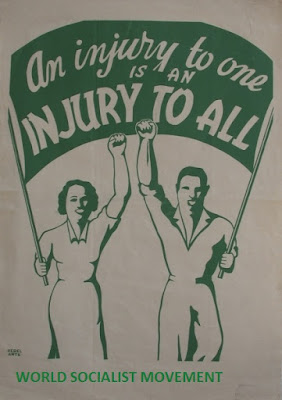The Socialist Party proposes the abolition of the private ownership of the means of social existence, land, machinery, etc. Socialism requires that the means of production and distribution shall cease to be privately owned and become the common property of society. This relates to the means of production and distribution and the consequence of their common ownership will be that the products will be freely accessible to the members of society. The Socialist Party's proposal is to change the social basis from private ownership of the means necessary to satisfy the economic needs of the community to one in which these things are owned and controlled by the whole of the people.
The first and most important effect must be to abolish class distinctions. Capital is not a thing but a social relation, one that comes into being whenever the producers are separated both from the means of production and from the products of their labour; this means that they can only get a living by selling their mental and physical energies, their productive skills, for a wage. The population of the planet have to put up with lives of slavery and the never-ending struggle against poverty, yet a life of ease and freedom is within their reach if they will stretch out their hands and grasp it. Our world has the necessities of a good life in abundance, yet misery and destitution are in super-abundance. We live in a society in which almost everything we need is owned by someone else. It is their property. We must buy it from them.
When all those things necessary for the community's well-being cease to belong to individuals but are owned as a single undivided instrument of production and distribution by the whole people as an organic unit, none are possessors and none have any advantage over others. Since all are in the same situation, all have the same interest, namely, to make the means of gaining the common livelihood serve with the utmost efficiency the common purpose. Society, therefore, so long rent by class divisions. founded upon unequal property conditions, at once loses its class nature with the abolition of private property, and being classless, there can be no class interests. The putting of all men and women on the same economic plane reconciles their interests, and just as those with the same interests under the class system combined to strive for the class interest, so the whole of society, having been made one by their unified interests, will combine to further the common interest. The old and bitter struggles between sections of the community, which socialists know as class struggles, will no longer be known.
The capitalist class, by means of their control of the media, are able to focus the attention of the working class on things that are often of little concern or consequence, permitting the exploiter to devote his energies more closely to his profits. The exploiter could not long continue in his privileged position if he failed to keep going through the wheels of deception; the capitalist not only lives at the expense of his victims but he succeeds in preventing them from finding out how it is done. It is obvious that the process will continue until the worker decides to end it, and the idea of ending it will never enter his head until he realises that only by doing so can he hope to enjoy a life worth living.
By studying capitalism we learn that human society is not the result of some eternal logic or divine laws but is created through our own actions.






